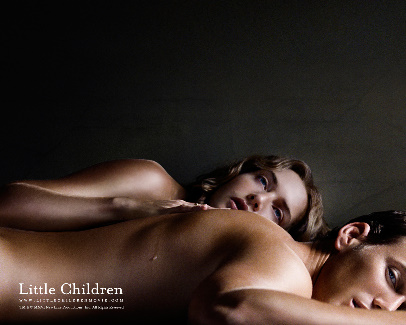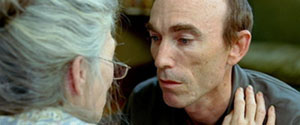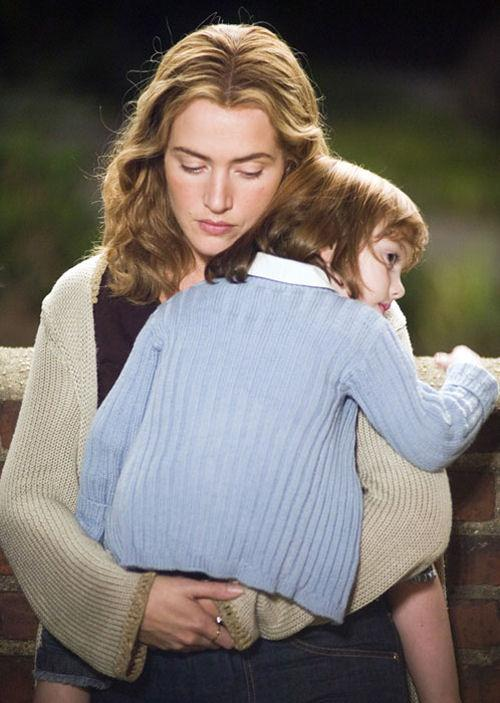Children Playing in Hollywood
by: Judith Halberstam / University of Southern California

Little Children movie poster
Todd Field’s Oscar nominated feature, Little Children, received rave reviews in 2006 for its careful depiction of the hopes and fears that nestle beneath the surface in suburban heterosexual America. In the film, a veneer of serene family life quickly gives way to reveal a shadow world replete with sexual menace and fascinating perversity. In fact, the promise of Little Children lies in its apparent commitment to exposing the hypocrisy of bourgeois suburban Christian morality. And, pedophilia serves, at the beginning of the film, as a marker for the witch-hunting propensities of white “neighborhood watch” societies and lets the viewer believe that the film’s narrative thrust involves a hard and long look at the inadequacies of heterosexual marriage and the lengths to which suburban heteros will go to find scapegoats for their own deep wells of loneliness.Little Children tells three interlocking stories: in the first, Sarah Pierce (Kate Winslett) sits apart from the other suburban mums at the local playground and marks her distance from their parochial and repressive enforcement of social norms. Pierce, as her name implies, can see through the judgmental stance of the mothers and unlike them, she is not afraid to admit to her dissatisfaction with marriage and motherhood. When an attractive stay at home dad, Brad Adamson (Patrick Wilson) appears at the playground, her interest is piqued. Sarah is unhappily married to an older man, Richard (Greg Edelman), who spends his spare time absorbed in internet porn. Again, as his name implies, Richard is purely and simply a dick and we are at a loss to understand why Sarah has married him. Brad Adamson, on the other hand, also carrying an allegorical name implying some kind of oedipalized masculinity, is a law student married to a cold and driven wife, and he is struggling to hold on to some fragment of his youth before disappearing into the career she has fantasized for him. Finally, in this suburban Greek drama, enter Ronnie McGorvey (Jackie Earle Haley), an odd looking and shy middle-aged man, newly released from jail for pedophilia. Ronnie (notice the childish name) lives with his mother in a dark house full of childhood dolls and miniatures and he is persecuted by a neighborhood cop who retired under suspicious circumstances and who now makes it his duty to spy on McGorvey and warn the neighborhood against him.
Critics like A.O. Scott in the NYT and Carina Chocano in the LA Times were wild about this film and praised it for the beautiful camera work, the melding of menace to coziness in its sunny settings and the subtle and intelligent dissection of suburban dysfunction. The film, however, is actually a strangely crude and ultimately hateful confirmation of the very same moral structures that it seems at first to be critiquing. To my mind this weird cycle by which the very conditions of unhappiness at the start of the film become the resolution at the end, the diagnosis becomes the cure, is representative of the narrative code of many liberal Hollywood films, like American Beauty for example, and it allows very conservative cultural texts about sexuality and domesticity to pose as radical and alternative ones.
Let’s see how Little Children manages to sneak normativity into the plot as resolution for the problem of the community enforcement of …normativity! The schema of the film works almost off a blueprint for psychoanalytic family structure: Sarah does not want to be a mother to her daughter and her husband does not want to be a husband to his wife. She fails to be mother, he fails to be father and in fact, in their first encounter in the film, she catches him masturbating in his study setting her up as the castrating mother to the naughty auto-erotic son. Brad does not want to be a father to his son but would rather remain a son (Adamson) and he watches teenage boys skateboarding in the evening when he should be studying, longing for the freedom implied by their flights through space and time. Ronnie cannot transition from being son to his mother to being a husband to an adult woman (as we witness in a painful date scene) and he regresses into boyhood as soon as he re-enters his mother’s house. Seemingly, the problem here is heterosexuality writ large with its imprisoning structures of normative gender and its suffocating modes of domesticity. People get married for all the wrong reasons, the film implies, and the society insists that they replace their parents by becoming them.

Brad and Sarah at the pool
And the first half of the film does indeed begin to unravel the social compulsion to conform, externally enforced and internally incorporated, that produces judgment, anxiety, fear and desire as its monstrous byproducts. The scene at the neighborhood pool, where Sarah and Brad are bathing in the sunlight of their newly ignited desire and where poor Ronnie is pegged as a predatory pervert and treated like a shark in the water, dramatizes the collision between fear and normativity that produces both the pervert and the conditions of his desire. But all of the tension of that scene, all of the criticism that it directs at the moralistic parents who use the notion of protecting their children as an alibi for outrageous behavior, disappears instantly when the cautious sympathy that the viewer has developed for Ronnie is erased by the revelation that he is not a suspected pedophile who is being unfairly treated but a real pedophile who also hates adult women and deserves our contempt and the violence of his neighbors.

Ronnie and his mother
Ronnie’s descent from wronged innocent to hideous pervert is matched in the film by the shift of sympathies away from the adulterous duo, Sarah and Brad, and towards the happy families that these infidels have disrupted. The porno obsessed Dick and the frigid Kathy suddenly seem like tragic victims of the selfishness and greed of their dysfunctional and adulterous spouses. While Sarah and Brad were the victims of their marriages when the film began, at its denouement the film refuses to make them the heroes of their adultery. So, if adultery is not the escape and the cure for a bad marriage, what is? Apparently, returning to the bad marriage is the only answer that the film can offer, oh and “grow up.”In the film’s crazed resolution, Sarah and Brad have decided to run away together. Sarah goes to wait for Brad in the playground and we see her willfully say goodbye to her daughter, choosing sex over family, desire over nurturing, her own happiness over the child’s. Brad leaves his home too but stops on the way to the playground to watch the skateboarders. In the meantime, who should enter the playground but our abject third, the perpetual outsider, the inhuman pervert against whose desires, Sarah and Brad and their spouses all seem pure, of course, Ronnie. Ronnie, we think, wants to hurt Sarah and a tragedy seems to be in the making. But no, goodness and truth, thank God, win out over perversity and evil and so while Brad hurts himself in the skateboard park trying a stunt for which he is too old, Sarah witnesses the self-castration of Ronnie. He looks up at her from the bench upon which he sits, lifts his hands from his crotch and reveals a bloody mess and a knife. Could anything be more blatantly Freudian than this diagnostic manual ending? The man who still thinks he is a boy falls off his skateboard and hits his head, when he comes to he realizes he loves his wife and in that moment he becomes a man. The woman who wants to be a daughter rather than a mother sees in Ronnie the disasterous results of poor parenting and rushes home to her child and her porno husband. The poor pervert who cannot become a man and wants to harm children serves as a warning to all who stray even a little way from the domestic lair in suburbia: if you cannot grow up and reproduce a replica of your parents’ home, his character implies, you will do horrible things to innocent people. And if you cannot control your impulses, you must be castrated.

Sarah and her child
The plot summary I have given here surely does not sound like the same film that critics hailed as “quietly devastating” (Peter Travers) and “intelligent” (A.O. Scott). And yet, I have not embellished the plot, its conceits or its imagined solutions to the problems introduced by each character. Why would critics see this sophomoric understanding of desire and domesticity as complex, intricate and subtle? And why raise the topic of pedophilia as a way of discussing suburban witch hunts only to transform it into a trope for what is wrong with suburban heteronormativity? In the end, we are asked to believe, there is nothing wrong with the family, nothing faulty about hetero marriage, the only problem in suburbia is indeed the lurking pervert who wants to harm you and your children. In a security age, perhaps, we cater to existing fears and we are complicit in creating new ones all so that, apparently, in the end all we can ask is that the state protect us from the very thing that it has manufactured as the cause of our alarm.
Image Credits:
1. Little Children movie poster
2. Brad and Sarah at the pool
3. Ronnie and his mother
4. Sarah and her child
Please feel free to comment.
Halberstam’s analysis of the relationship between Ronnie and Sarah/Brad highlights the connections made between child abuse and child abandonment, and addresses the stigma surrounding both actions. I appreciate the critical analysis of Little Children, especially in contrast to the majority of glowing reviews. The deflection of unflattering characteristics and behaviors onto marginalized others is hardly new, but this article addresses the ways in which marginalized characters are becoming THE stand in for issues and problems with heteronormativity and suburban life.
I am not defending the film, or questioning this reading of it, which I’m inclined to agree with. However, I wonder how a film like this (or American Beauty or any of those similar cinematic enactments of quiet desperation) could end that wouldn’t wind up reinforcing these types of values.
If Sarah and Brad had run off and lived happily ever after, they would have, to some degree, still been reinscribing heteronormative gender/sexuality. If, instead, something tragic had happened to either Sarah or Brad, the film would seem to be punishing them for their indiscretions.
A good case against the movie’s idea of “epiphany” and “redemption”
I must admit that I have a few concerns about this reading of the film. While the overall argument here may very well stand up to these concerns, there are a number of issues which at least bring the argument into question and ought to be addressed. These concerns are brought about by the assertion that the above reading has “not embellished the plot, its conceits or its imagined solutions to the problems introduced by each character.”
A number of these are differences of interpretation. For instance, I would not read Adam’s wife as cold, distant, or frigid. Instead, she could be seen as strong, passionate, and motherly. In addition, I would make a stronger argument that Ronnie’s characterization does not reduce to “a warning to all who stray even a little way from the domestic lair in suburbia.” Indeed, Ronnie’s characterization problematizes suburbia’s fear of sexual non-conformity. There is on one hand Ronnie’s own admission that he has a psychotic disorder which weakens popular assumptions that pedophiles are simply animals and perverts. On the other hand, there is pathetic Larry (the retired officer), whose obsession with Ronnie has led to a failed marriage and his own arrest.
More importantly however, there are simply a number of claims about the plot that seem to be simply inaccurate. First, Larry does not retire under suspicious circumstances. Larry very clearly explains the reason he retired in a conversation with Adam. Second, I do not remember any moment in the film where Ronnie is portrayed as a “suspected pedophile.” His guilt never seems to be in question in the film. Third, Sarah does not “willfully say goodbye to her daughter.” Sarah takes her daughter with her to the park and, presumably, to her imagined life with Adam. Fourth, Sarah never discovers that Ronnie has castrated himself. As she is cautiously attempting to find out what is wrong with Ronnie as he sits hunched over on the swing set, she turns to find her daughter is not where she left her thirty feet away. Sarah immediately runs out of the park looking for her daughter, who is found safely in the road staring up at bugs flying around a street light. It is, in fact, Larry who finds out what Ronnie has done to himself and attempts to rush him to the hospital.
In the end, I would add that I cannot find any indication that there are multiple versions of the film. These clear discrepancies, then, may not alter the above argument, but they are all used as evidence. If nothing else, these inconsistencies should bring the argument into question. The film, a modern retelling of Madame Bovary, is not without its troubling conclusions, but it does deserve an accurate reading.
My question about this reading, however, is the intentionally open-ended resolution. What happens when Larry the former cop brings Ronnie to the hospital — is Larry accused of maiming Ronnie? What happens when Sarah goes home to her husband — does she suffer in silence for the rest of his life, or divorce him and try to make it as a single mother? How injured is Brad? What if he has suffered a massive spinal injury and becomes dependent on expensive medical care that his wife’s family must now provide, even in the face of his mother-in-law’s suspicions that Brad was cheating on her daughter?
The open-endedness of the narrative makes it possible for us to read beyond the film into these potential resolutions in a manner that corresponds with our own attitudes towards heteronormativity in the suburbs.
The promise of Little Children is that it reveals the inadequacies of normative ideals of parenting, of right versus wrong, of adolescence versus adulthood. Instead of situating these positions as oppositional, the film reveals that all of these things are racked with ambivalence, and that the real neurosis is an obsession with clear distinctions and with easy judgments. Thus, Brad and Sarah do not hate parenting, but at times they resent their children and the life of restriction that parenting seems to demand. While Brad and Sarah’s children are allowed to be demanding and carefree, to have all of their desires fulfilled, Brad and Sarah are made to feel as though they cannot have any of these things. They both love and resent their children—a depiction that allows us all to claim these feelings as legitimate in a world where children seem to increasingly be given license to control so much in the lives of adults.
The same ambivalence is found in the depiction of Ronnie. We are made to sympathize with Ronnie in interactions with his mom, and his attempts to move on with his life after being released from prison. But we are also made to relate to the neighbors’ senses of fear. We are made to see that like Ronnie, Larry is also out of control and a potential threat: he was forced to retire after shooting and killing a teenager in an overreaction to a police call. He is portrayed as a rather pathetic man who has made it his mission to terrorize Ronnie. But in the moment when see that Ronnie is fully human and still a pedophile, we are forced to reconcile our characterization of anyone as a monster. And when Larry finds that Ronnie’s sense of self-hate drives him to mutilate himself, Larry is forced to recognize that he and Ronnie share a bond of self-hatred, despair, and pain. We both sympathize with and are afraid of both Larry and Ronnie at different points, but in their moment of intense pain, we see them as human beings—a characterization that forces us to acknowledge the core of our connections to one another.
In my reading of the film Ronnie does not serve as the foil against which the virtues of suburbia can be extolled. Instead, all of the characters in this film struggle with what it means to be an adult but to see and feel one’s self to have child-like impulses–to run away into a fantasy; to desire other children; to fight evil and be the “good guy.” Little children reveals that the distinction between adults and children is perhaps illusory.